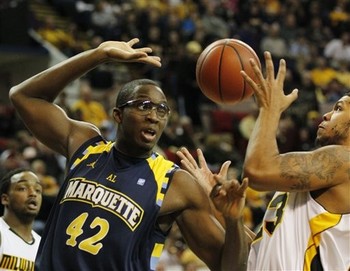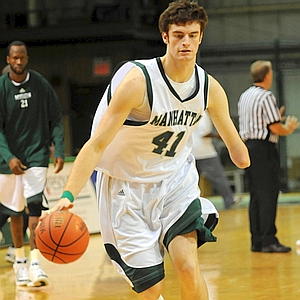Chris Otule & Kevin Laue Remind Us to Stop Complaining
Posted by rtmsf on January 6th, 2011The human body is an amazingly adaptable entity when faced with adversity. If it’s extremely cold, blood rushes from its extremities into the core to keep the central organs warm and functioning. If it’s too hot, buckets of sweat seep from its pores to act as an internal cooling mechanism. When injured, the fight-or-flight mechanism often makes a dangerous situation into a survivable one by buying time for the individual to get to safety. We all know these things to be true, and therefore it should be no surprise when we learn of astonishing people in the athletic realm doing astonishing things with their bodies. And yet we are.
Such was the case late last week when, during the Marquette-Vanderbilt game on ESPN2, commentator Mark Gottfried told the viewing audience that Golden Eagle center Chris Otule has only one functional eye. Come again? Most people, including many members of the Marquette fanbase, were not aware of the redshirt sophomore’s physical limitation, which begs the question of how Gottfried knew about it (did he recruit Otule while still at Alabama?) and why he chose a national television audience to out the player. Notwithstanding the possible HIPAA violation that Gottfried committed while on air, the bigger question is this: HOW ON EARTH DO YOU PLAY DIVISION ONE BASKETBALL WITH ONE EYE???
This is phenomenal. See, the beauty of having two eyes in our heads is that it provides us with what the smart folks call stereoscopic binocular vision, or essentially, the ability to see clearly in three dimensions. That third dimension relating to depth perception is the key, because it allows other animals an ability to gauge how far away their prey is and how fast it is going, while also allowing us human folks the convenient ability to accurately pass, catch and shoot a basketball while on the move. Now, with only one eye, a person can still gauge depth, but it becomes much more difficult, especially at close ranges. Even at farther lengths, it takes longer for a single eye to make determinations of relative distances, and the accompanying field of peripheral vision has been estimated as 25% smaller.
In other words, it’s harder. It’s harder to tell how fast a car is coming at you in a crosswalk and it’s harder to see a red-hot pass fired at you from your weak side. Otule said in an interview about his condition after it went public that he does in fact have trouble with short, quick passes made to him in the post, but since he’s essentially lived with monocular vision since he was a toddler (he had glaucoma at birth and the left eye was removed), he doesn’t notice any difference otherwise. The Marquette big man is averaging 5/3 in around fourteen minutes per game this season while hitting a superb 68% from the field, which goes to show that with enough heart, hustle and practice, even a one-eyed man can become a productive high-major D1 player.
Or a one-armed man. This story reminded us of Kevin Laue, the Manhattan College sophomore who made waves a couple of years ago when he received a scholarship offer to play for the Jaspers despite having only one upper appendage. The 6’10 center is not yet producing as much as Otule with only fourteen points and fourteen rebounds on the season, but his minutes have increased to double figures in three of his last six games and everyone continues to marvel with the skills he has developed despite playing with such a major competitive deficiency. Given the barriers to excellence in this game that he’s already overcome, we have absolutely no doubt that, like Otule, he’ll find a way to make himself valuable.
Laue and Otule are inspirational stories that serve to remind us that many things that seem impossible are quite possible with reasoned acceptance of one’s circumstances and the right attitude. If you think you doubt yourself too much, can you imagine how many times these two guys have let such demons into their own minds? Or how often they heard from people that they should probably think about doing something else other than basketball with their free time? All of us have flaws, but few of us have actual physical deficiencies such as theirs; yet we’d all do well to remember the lesson that these two young men teach us. The human body is an adaptable entity — if you’re unhappy with something about it, you can work to change it. Most everything else is just excuses.












































